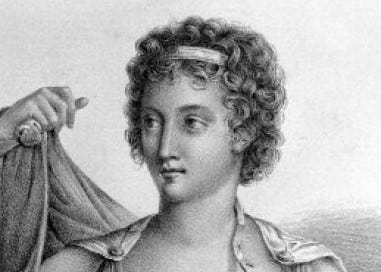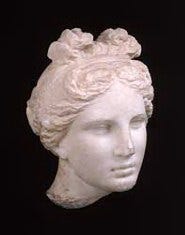Dear Classical Wisdom Kids,
This week has been… intense! We are staying with friends here on the island of Corfu, so Frida has been very busy being an 8 year old and playing with her buddies while she can see them….which has been wonderful!
But… we also had the issue of the forest fires… which were very close to our airbnb. Fortunately, we have since moved further down the island and far from harm’s way. A special thank you to the very brave firefighters who have been working hard to keep everyone safe! It has been amazing to watch the helicopters pick up the water from the sea and carry it off to douse the flames:
As such, Frida will return to her regular postcards next week. (She has some SUPER COOL ones regarding ancient inventions that you all will love…including a few videos to share, too!)
But we don’t want anyone to miss out on awesome ancient history. So today, I’ve posted one of Frida’s all time favorite stories of Agnodice… the first female physician… Maybe?
What is Apocryphal?
Before we can really dive into Agnodice’s story, it’s important to point out that it is one of those tales which has always been, and will probably always be, a historical mystery.
Some scholars believe that it is historical fact, while others place it squarely in the realm of myth and legend - or apocryphal. We may never know the real answer—but it is, without a doubt, a good story.
Classical Wisdom Kid Members:
Enjoy our in-depth Discussion and “Go Further” section below… including WHY women weren’t allowed to practice medicine and HOW childbirth got so dangerous… as well as more evidence as to whether or not this story is really true?
Not a member, join the club here!
Enjoy!
All the best,
Anya Leonard
Founder and Director
Classical Wisdom and Classical Wisdom Kids
Agnodice: The First Female Physician…Maybe
Agnodice was born into a wealthy Athenian family around the fourth century B.C.E. As she grew up, Agnodice was upset by how dangerous it was for the babies and mothers during childbirth. This inspired Agnodice to want to study medicine. Unfortunately, women were not allowed to study or practice any form of medicine, especially gynecology—in fact, it was a crime punishable by death!
Determined to do something about the problem, Agnodice cut off all her hair, dressed in male clothing, and traveled to Alexandria to study medicine.
She then traveled back to Athens, where, legend has it, she heard the screams of a woman in labor as she walked down the street. When she rushed in to help—still looking like a man—the mistrustful women in the room tried to force Agnodice out. Frustrated, Agnodice pulled aside her robes and revealed herself as a woman. The expectant mother then accepted help from Agnodice, whose medical knowledge resulted in a safe delivery.
After this first success, news of Agnodice—who continued to dress as a man in order to practice medicine—spread throughout the female community. Suddenly, the services of a “male” doctor were constantly in demand. This was immediately suspicious to the men of Athens, who believed that Agnodice was somehow making the women fall in love with “her”... and so she was brought before a jury.
Agnodice, the legend goes, showed she was a woman, to prove the suspicious men wrong. This, unfortunately, only made things worse for Agnodice. Angry that a woman had been practicing medicine, the men immediately sentenced Agnodice to death.
But then... her patients realized what was happening!
A large group of Athenian women (including wives of the men who wanted Agnodice dead) stormed in and demanded that Agnodice be freed.
“You men are not spouses,” they said, “but enemies, since you are condemning her who discovered health for us.”
Faced with the anger of their wives, the men decided to change the law. Thanks to Agnodice, freeborn women could legally study and practice medicine, as long as they treated only female patients.
Agnodice’s story has earned her the title of “first female physician” and she herself has become a symbol of female equality, determination, and ingenuity.
Discussion:
In the end, Agnodice not only represents the (to this day slightly contentious) desire
Keep reading with a 7-day free trial
Subscribe to Classical KIDS to keep reading this post and get 7 days of free access to the full post archives.





